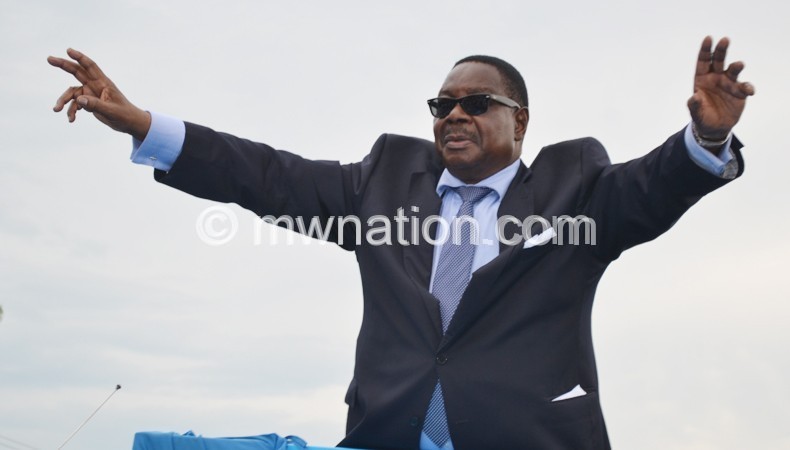Peter Mutharika’s treason charges to be dropped
The Director of Public Prosecutions (DPP) has dismissed treason charges against newly elected President Peter Mutharika and is consulting the Attorney General (AG) on the possibility of dropping similar charges which former Democratic Progressive Party members are facing.
The development comes following Mutharika’s lament at his inauguration on Monday that he faced persecution under the previous regime when he alongside former Cabinet ministers in the Bingu wa Mutharika administration and former chief secretary to the Government Bright Msaka were charged with treason.

AG Anthony Kamanga said yesterday the sitting President was immune to prosecution as stated in Section 91(2) of the Constitution which says: “No person holding the office of President shall be charged with any criminal offence in any court during his term of office.”
Said Kamanga: “I can only confirm that a sitting President has immunity. I am yet to consult with the DPP, but if he is saying he is reviewing the whole case, then that is a better approach as it was a conspiracy case.”
In an interview yesterday, DPP Bruno Kalemba confirmed his office was reviewing the treason case against the DPP heavyweights and conceded technically that withdrawing the case was among the options.
Democratic Progressive Party heavyweights charged alongside Mutharika include Jean Kalirani, Kondwani Nankhumwa and Patricia Kaliati who have since been re-elected as Members of Parliament (MPs), Goodall Gondwe, Nicholas Dausi, Simon Vuwa Kaunda and Msaka.
However, a different view has emerged about the possibility that the treason case against Mutharika could be dropped because he enjoys immunity from prosecution, with some lawyers arguing that the word “charged” has brought a conundrum to the matter because Mutharika started facing prosecution before he assumed the office of president last Saturday.
According to lawyer Justin Dzonzi, the term “charged” in Section 91 (2) assumed that the person would already be holding office, but it excluded the possibility that a new president already facing criminal charges would assume office.
“The Constitution did not anticipate the election of someone into office who was already facing criminal charges. As it stands, both would enjoy immunity the difference being that in the case of the person already being prosecuted, the Director of Public Prosecution could stay the criminal proceedings for the duration of the term but resume upon the person leaving office,” he said.
The last time Mutharika and others appeared in court, there was an objection that the counts were too vague and the State was ordered to file fresh charges.
Dzonzi said the word ‘charged’ in the Constitution was used to communicate process used to start criminal prosecution and in the case of Mutharika and others, prosecution had started.






It would be of interest to find out the origin of these allegations! This would help clean politics in Africa!
after the immunity from prosecution then he will face the allegations I guess
As a Legal Analyst, Hans Kelsen’s Law, the “Grand Norm” puts President Prof A P Mutharika and his “Co-Accused” at an advantage because “Status Quo” changed in a Peaceful rather than a Violent way with the “Declaration by MEC Chairman, Hon Justice M. R. Bendera SC” of the Presidential Elections 20th May 2014 Results on 30th May 2014. Former President Joyce Banda failed to subvert the electoral process by “Issuing a Decree to Nullify the Elections Before Results could be Declared … By All Account that Action Amounted to ..A Failed Civilian Coup d’Etat Which in Her Expectations could have Temporarily Retained the Old Order .. Which Same Old Order Persecuted the Mutharika Group .. My View is that the Olive Branch Offered by the New President Should Not Fall on Bare Stones .. May God Bless Malawi ..!